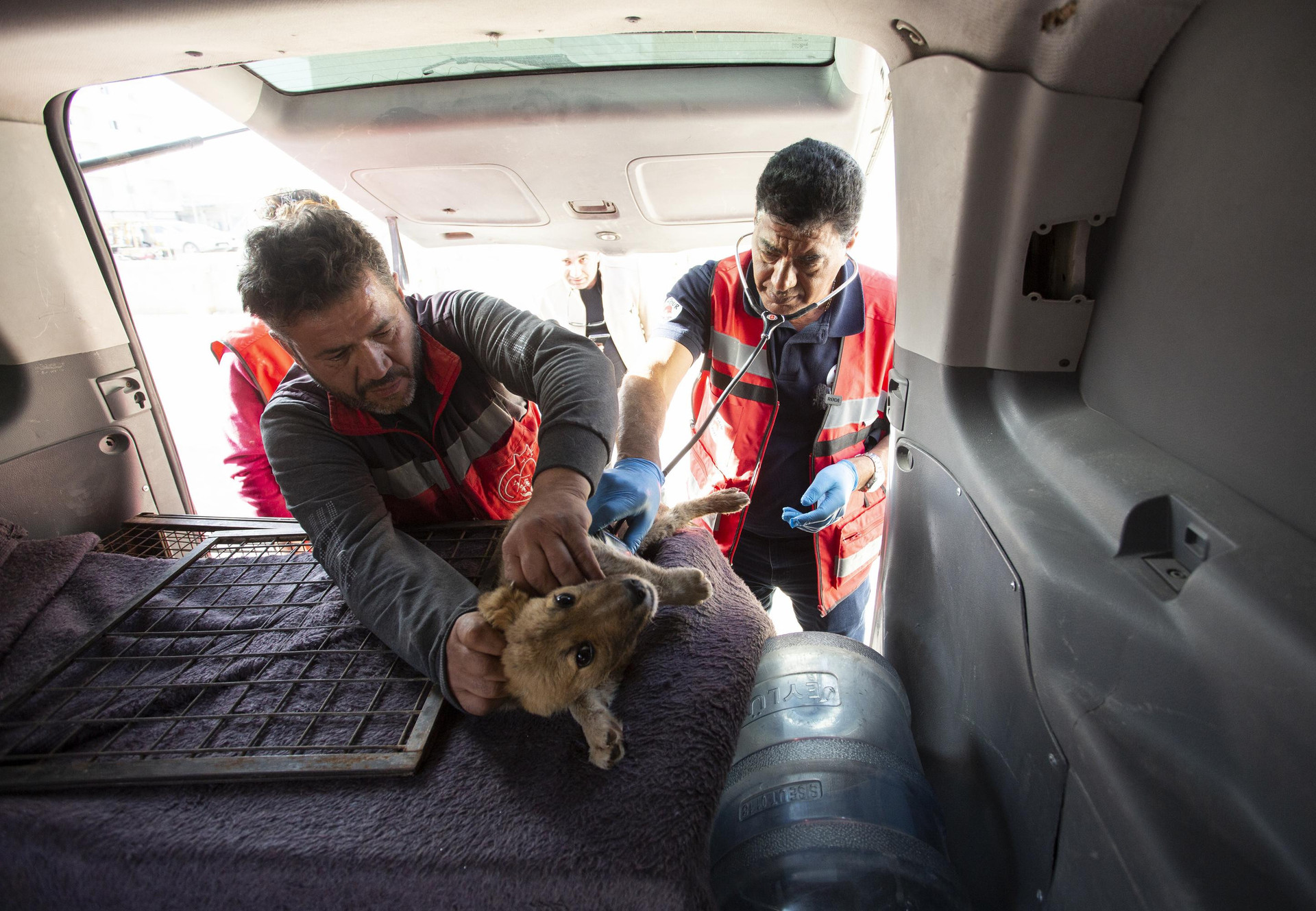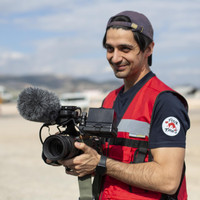
Seven hours in syria to deliver aid for animals
The Mission team travels to Jindires, where residents are desperate for support following the earthquakes
Crossing the border from Türkiye to Syria to provide aid for animals is bureaucratic and logistical parkour. The FOUR PAWS Rapid Response Mission team, nonetheless, managed to secure single entry in Syria for seven hours to deliver 20 tonnes of farm animal feed and 3.6 tonnes of dog and cat food to the city of Jindires. Our early-morning trip starts with a 200 km drive from Gaziantep, Türkiye to the border of Syria. The plan is to rendezvous there with our two shipments – one of cattle feed, one of dog and cat food – and load everything onto a single truck before crossing.
So far, everything has gone according to plan. Upon arrival at the border, the authorities checked and approved our passports – our contacts had done a good job of securing our passage. The farm animal feed had been loaded onto our transport truck and we are almost ready. However, there is no sign of the truck carrying our shipment of dog and cat food. With valuable daylight wasting away, there are concerns that we might just have to leave that shipment behind. But in the knick of time, we see the small truck finally turn the corner in the distance.
Without a minute to waste, the team gets into action, hurling close to 300 15 kg-bags of dry food overhead into the truck bed, loading 3.5 tonnes of food onto the semi-truck in record time. It is a huge effort under the midday sun, and by the time we're done, we've more than simply worked up a sweat: the team is practically out of breath. But as the now complete shipment truck starts moving towards the border control, we know the hard work has actually only just begun.
Incomparable devastation
Nothing can prepare you for the drive into Jindires, not even a couple of weeks of working in the affected zones in Türkiye. In Türkiye there is machinery, there is aid, there are NGOs, and a feeling that – however slowly – people are moving forward and rebuilding. From the sight in Syria, the earthquake may as well have happened yesterday. The city looks like a war zone, with rubble covering the sidewalks, often also the streets. Jagged stone and sharp metal threatens to catch you at every turn if you are not mindful of where you step. The most precarious-looking remains of buildings haven't yet been torn down – there's just no way to do it – and hang like a constant menace overhead.
The sad image of a dog on the sidewalk, dead for a few days now and still lying there unremoved, paints a clear picture of the lack of resources and support here.
For safety reasons, our truck is diverted to a secure location away from the urban areas to distribute the feed. Meanwhile, the rest of the team heads to visit some of the families whose farm animals need our help. Dr Khalil, the mission lead, hands out medicine and medical advice. At this, and the promise of food for their animals, the faces of the villagers light up with hope and gratitude.

The famed Cat Man from Aleppo
We then drive to a noisy parking lot where a group of men are trying to fix the engine of an old diesel truck. There we meet animal advocate Mohammad Alaa, the famed Cat Man from Aleppo, who has driven his animal ambulance all the way here to meet Dr Khalil in person. With the initial niceties quickly out of the way, he brings out a patient from his vehicle: a small dog rescued from the earthquake showing clear signs of distress and aggression. The reason quickly becomes clear: a wooden splint is supporting a rear leg from which an exposed bone is poking through. It is evident that the dog needs better care than can be provided in this dusty parking lot by the side of the road, so Dr Khalil decides we'll try to get the dog back across the border and to the PanVet clinic in Gaziantep.
We reach our truck’s location to ensure it has safely reached its destination and that the distribution is going as planned. But the sun has begun to set and, with the remaining daylight burning fast, we have a very small window of time to get back to the border crossing before dark, when it will close until tomorrow. For the 45-minute drive back, the rolling Syrian hills of olive tree plantations are just a blur outside my window as our driver races to get us back, swerving between cars and motorcycles - and in and out of countless armed checkpoints - with surgical precision.
We make it just in time and – don't ask me how – Dr Khalil manages to effortlessly get the injured dog across the border check. After a whirlwind of a day, we make it safely back onto Turkish soil as night falls.
A palpable sense of trauma and loss
We suddenly realise just how exhausted we are. We need a drink of water, maybe a coffee, before the long drive back to Gaziantep. Along our route, however, no shops seem to be open anymore. By the side of what looks like an abandoned petrol station, we find a group taking shelter in a small container. We ask them if they know where we can find some coffee and, without hesitation, they invite us – a group of foreign strangers after dark – into their abode, to offer us what little they have. As a few shy children and young women glance at us from a corner, the man tells us how his village was completely flattened, how he lost his wife and daughter, and how this small group is now all the people he has left in the world. As the man tells their story, I notice one of the girls is staring blankly at the floor, the trauma evident in the emptiness of those eyes. I think I’ve managed to remain fairly composed over these past two weeks of daily exposure to constant devastation and tragedy… but this gesture of hospitality, together with their story of loss and the look on this girl’s face shakes me up inside a little bit more than I like to admit.

Our team of four rides in silence through the night, in a compact car loaded to the brim with veterinary equipment, helmets, cameras, backpacks, and a single crate containing a little dog whose life has been saved and who will likely be on his way to recovery soon. The thought strikes me that in less than 12 hours I'll be back in the comfort of our Vienna headquarters. I don't yet know how it will feel to be back home in such a different reality from the past two weeks. But what I do know is that right here, right now, I couldn’t be more proud of the whole FOUR PAWS team, and whatever small difference we’ve managed to make here.
Note: Any advertisements that may appear during the viewing of this video are unrelated to FOUR PAWS. We assume no liability for this content.
FOUR PAWS has concluded its Rapid Response Mission on the ground in Türkiye and Syria. We will continue to provide urgent care and food for animals in collaboration with partner organisations in Türkiye and Syria.









